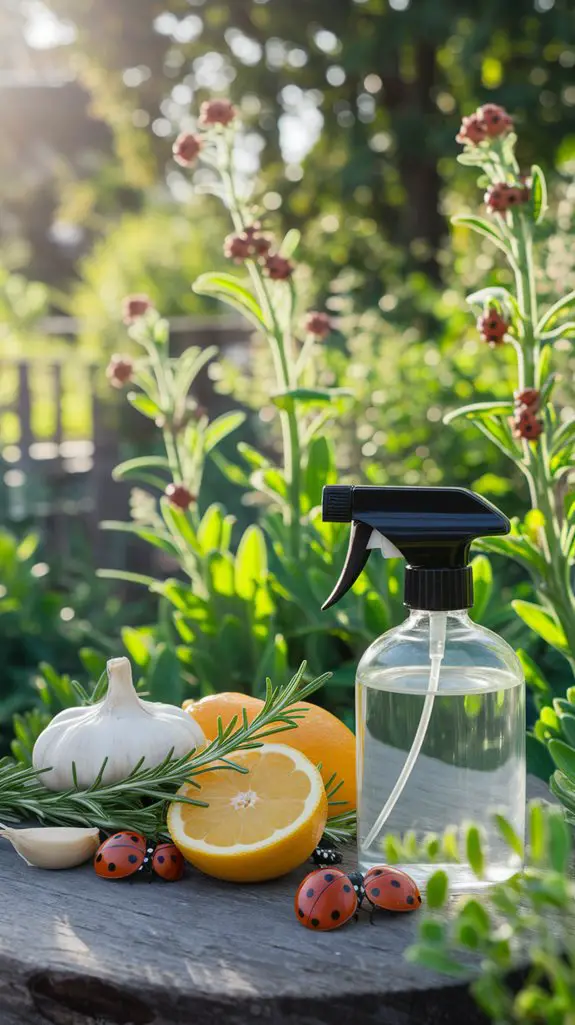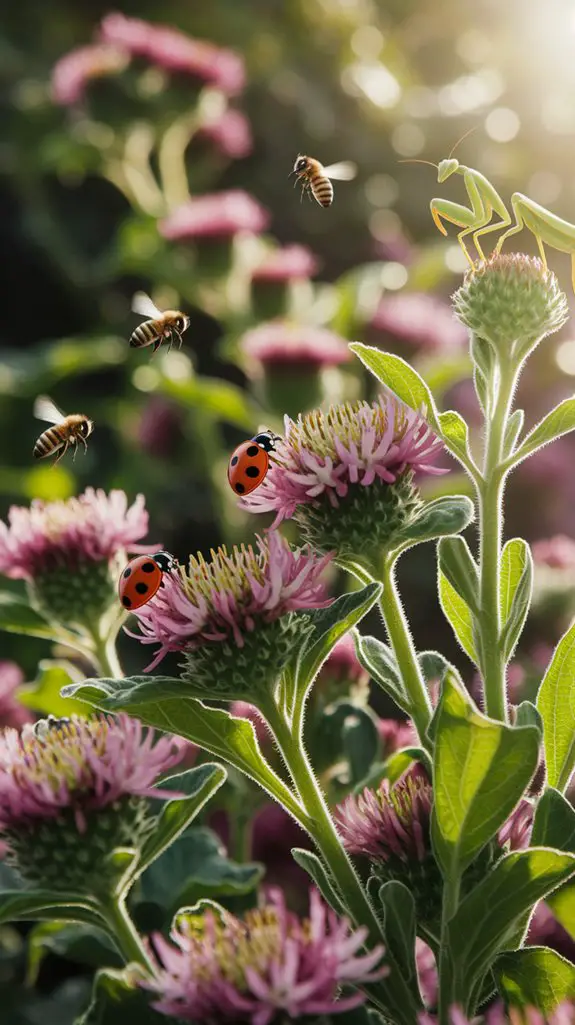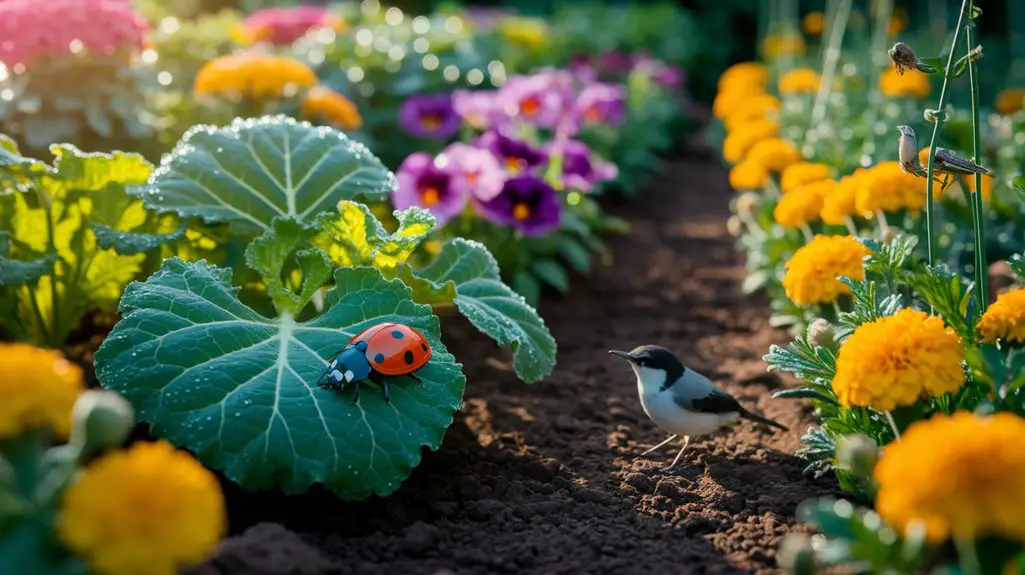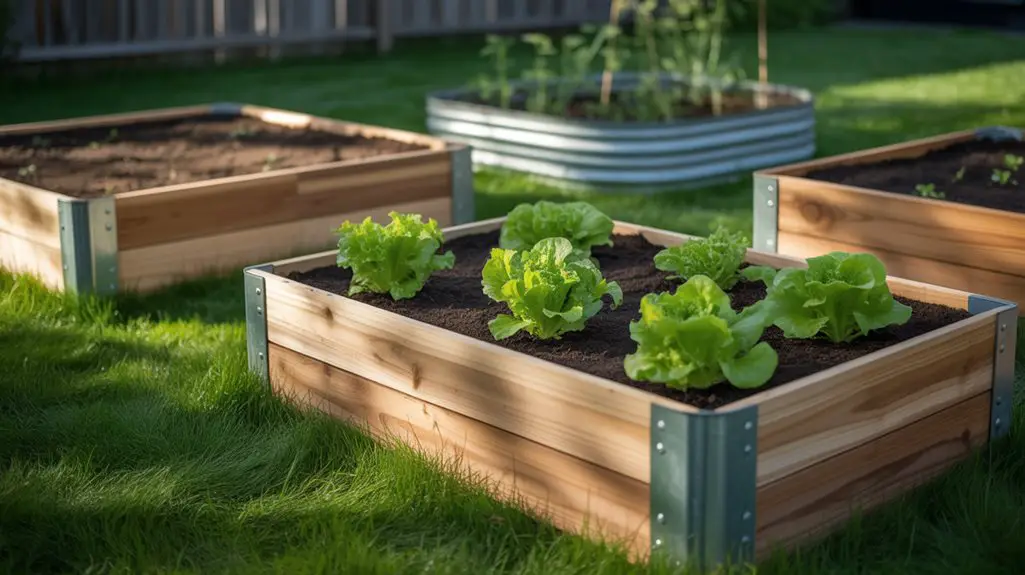When you’re battling garden pests, you don’t need to reach for chemical solutions. Your garden already holds the keys to natural pest management through its intricate ecosystem connections. By strategically partnering plants, crafting simple homemade solutions, and inviting helpful insects into your space, you’ll create a balanced environment where pests can’t dominate. These three approaches work together to protect your harvests while preserving the health of your soil and surrounding wildlife.
Companion Planting Strategies to Deter Garden Pests
Companion planting, one of nature’s most elegant defense systems, works by strategically positioning plants that naturally repel specific pests alongside vulnerable crops.
You’ll find marigolds effectively deter nematodes and aphids when planted near tomatoes, while nasturtiums act as sacrificial plants, drawing aphids away from your vegetables.
Try planting aromatic herbs like basil near tomatoes to confuse and repel thrips and hornworms.
Chives and garlic deter aphids when grown beneath roses, while catnip repels squash bugs, ants, and flea beetles throughout your garden.
For maximum effectiveness, intersperse companion plants throughout beds rather than isolating them in one area.
This biodiversity not only protects your crops but also creates habitat for beneficial insects that prey on garden pests, establishing a balanced ecosystem in your garden. Additionally, incorporating essential plants for organic pest control can further enhance your garden’s defenses against unwanted invaders.
Creating Homemade Natural Pest Repellents

Beyond plant partnerships, you can craft effective pest deterrents from everyday kitchen and garden ingredients. These solutions work with nature’s systems rather than disrupting them, preserving beneficial insects while targeting problematic ones.
- Garlic-pepper spray – Blend garlic cloves and hot peppers with water, strain, and add a drop of biodegradable soap. This potent mixture deters aphids, beetles, and caterpillars without harming your soil.
- Neem oil solution – Mix one tablespoon of neem oil with water and a tiny amount of dish soap. It disrupts pest feeding and reproduction cycles while remaining safe for pollinators when dry.
- Diatomaceous earth barrier – Sprinkle this fossilized algae powder around plants to create a microscopic barrier that dehydrates soft-bodied pests but degrades naturally into the soil.
Additionally, using natural pest control methods can help maintain the ecological balance in your garden, ensuring that beneficial insects thrive alongside your plants.
Attracting Beneficial Insects to Your Garden Ecosystem

Creating a thriving garden ecosystem often depends on recruiting nature’s own pest management team. Ladybugs, lacewings, hoverflies, and parasitic wasps act as natural predators, controlling aphids, caterpillars, and other destructive pests.
To invite these helpful allies, plant diverse flowering species like dill, fennel, cosmos, and alyssum that provide nectar and pollen. Include different bloom times to guarantee year-round food sources.
Add structural diversity with varying plant heights and habitats—rock piles, dead wood, and water features—where beneficial insects can shelter. Additionally, maintaining a habitat for beneficial insects encourages their presence and helps balance pest populations naturally.
Avoid broad-spectrum insecticides that kill indiscriminately. Instead, practice tolerance of minor pest damage, a sign your garden is supporting complex food webs.
Conclusion
By embracing these natural pest control methods, you’re not just protecting your garden—you’re becoming a guardian of a delicate web of life. Each companion plant stands as a shield, while homemade sprays work as gentle healers rather than harsh weapons. As butterflies and ladybugs dance among your flowers, they’re signing nature’s contract to keep balance. You’re not controlling your garden; you’re conducting its symphony.




